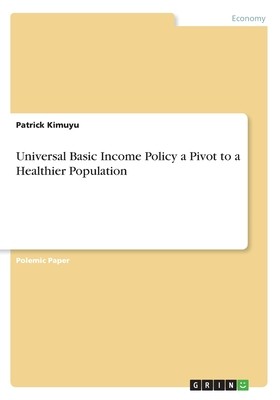
- We will send in 10–14 business days.
- Author: Patrick Kimuyu
- Publisher: GRIN Verlag
- Year: 2018
- Pages: 20
- ISBN-10: 3668682755
- ISBN-13: 9783668682757
- Format: 17.8 x 25.4 x 0.1 cm, minkšti viršeliai
- Language: English
- SAVE -10% with code: EXTRA
Universal Basic Income Policy a Pivot to a Healthier Population (e-book) (used book) | bookbook.eu
Reviews
Description
Polemic Paper from the year 2018 in the subject Economy - Health Economics, grade: 1, Egerton University, language: English, abstract: Over the decades, welfare states have been making effort to address social risks, in order to enhance the wellbeing and economic prosperity of their citizens. However, the post-industrial welfare state is experiencing a significant social risk shift due to social change. It is apparent that the post-industrial social change has led to the emergence of what the current literature refer to as "New Social Risks." This implies that welfare states are facing a more complex task of responding to the "New Social Risks" which are attributable to changes in family structures and transformation of the labor market. From a critical perspective, the "New Social Risks" facing Australia and other affluent countries include precarious employment, gender inequality, economic insecurity, and poverty. Issues such as single parenthood, possession of obsolete or low skills, care for the elderly and disabled people, and work and family life balance are considered as new social risks. Even though a precise definition of the New Social Risks concept is entirely missing in literature, it is believed that these social risks are related to socioeconomic transformations within post-industrial societies. To address these risks, a universal basic income has become highly debated. However, the proposed Universal Basic Income policy is not a policy reform that fits all. Countries have to weigh its benefits and limitations. In the case of Australia, the key question should be whether this policy is ideal to solve the emerging social risks or not. Again, it is worth to consider its cost; can Australia afford it? Therefore, this essay presents a focused argument on whether Australia should adopt a basic income policy or not.
EXTRA 10 % discount with code: EXTRA
The promotion ends in 23d.03:44:19
The discount code is valid when purchasing from 10 €. Discounts do not stack.
- Author: Patrick Kimuyu
- Publisher: GRIN Verlag
- Year: 2018
- Pages: 20
- ISBN-10: 3668682755
- ISBN-13: 9783668682757
- Format: 17.8 x 25.4 x 0.1 cm, minkšti viršeliai
- Language: English English
Polemic Paper from the year 2018 in the subject Economy - Health Economics, grade: 1, Egerton University, language: English, abstract: Over the decades, welfare states have been making effort to address social risks, in order to enhance the wellbeing and economic prosperity of their citizens. However, the post-industrial welfare state is experiencing a significant social risk shift due to social change. It is apparent that the post-industrial social change has led to the emergence of what the current literature refer to as "New Social Risks." This implies that welfare states are facing a more complex task of responding to the "New Social Risks" which are attributable to changes in family structures and transformation of the labor market. From a critical perspective, the "New Social Risks" facing Australia and other affluent countries include precarious employment, gender inequality, economic insecurity, and poverty. Issues such as single parenthood, possession of obsolete or low skills, care for the elderly and disabled people, and work and family life balance are considered as new social risks. Even though a precise definition of the New Social Risks concept is entirely missing in literature, it is believed that these social risks are related to socioeconomic transformations within post-industrial societies. To address these risks, a universal basic income has become highly debated. However, the proposed Universal Basic Income policy is not a policy reform that fits all. Countries have to weigh its benefits and limitations. In the case of Australia, the key question should be whether this policy is ideal to solve the emerging social risks or not. Again, it is worth to consider its cost; can Australia afford it? Therefore, this essay presents a focused argument on whether Australia should adopt a basic income policy or not.


Reviews